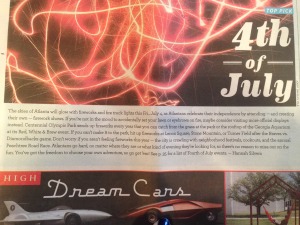Hannah Silvers ‘17 – ENG, PWR and CRW Major
Hello all! I’m Hannah Silvers, a rising sophomore English major with concentrations in PWR and Creative Writing and a minor in Economics. I’m an Honors Fellow at Elon and a copy editor for The Pendulum, our student newspaper. This summer, I worked as the operations intern for Creative Loafing, a multimedia company whose alternative newsweekly paper boasts the second-widest circulation in Georgia. I worked with former operations editor and current managing editor of Creative Loafing, Alicia, and my internship mentor, Dr. Rebecca Pope-Ruark. “Operations” entails a host of different responsibilities, among them event database management, fact checking, copy editing, and even a little bit of writing. In this blog post, I’ll run you through two of the typical work assignments for a Creative Loafing operations intern and the rhetorical skills that come along with them. For a discussion of two more, please feel free to consult last week’s Part 1.
Copy editing
Here’s an example from my time at CL. Alicia gave me three articles from the Food section to copy edit. As I read the first one, I realized that I was making a lot of comments about the negative and overly critical tone that the author used to describe the three restaurants in the article. The author used patronizing language to describe the furnishings, the live entertainment, and even the food. The tone made it difficult for me to sympathize with the writer’s point of view or appreciate the review.
I brought up my concern to Alicia, telling her that I didn’t know if it was my place to suggest a change in tone the day before the paper went to press but that the style of the article was more than a little off-putting. After reading it, she told me that she agreed with me but didn’t think the writer would have time to redo the entire article in time. So we decided to publish it without changing the tone. The readers who left paragraph-length comments on the online version of the article are all we needed to know that we were right. Alicia and I scanned a few of his other articles and saw the same tone creep into more than one. Alicia decided to bring up the issue to the section editor, who took care of the issue. This episode was a reminder that the copy editor’s job is to make sure that the company is represented properly.
Writing
Writing is a smaller part of my internship than these others, but I have had a few bylines in the paper and on the Fresh Loaf blog. With the kind of writing I do at CL – mostly blurbs, nothing more than 200 words – my main focus is matching the style of my writing to the examples that Alicia gives me. If that’s not a rhetorical exercise, I don’t know what is.
The longest piece of writing I’ve completed so far was a 200-word blurb that accompanied a full page of July 4th events. Since I entered dozens of them in the database, I had a solid foundation on which to write. The blurb introduced the spirit of the holiday and a few of the major events that happened all around the city.
To put this blurb together, I got last year’s 4th of July blurb from the archives. She wrote it last year “in about two seconds,” according to her, but she said that she wanted something similar. I made a bulleted list of the things I noticed in last year’s blurb as a way to guide what I did this year: colloquial language (using “you,” “bless ya,” and a few curse words); started with a catchy idea (besides the terribleness of the humidity of Atlantan summer, Atlantans can all agree on one thing: that we all like to blow shit up); mentioned several different kinds of events like parades, neighborhood festivals, and barbecues, but focused on public fireworks shows; ended on a punchy note (“God bless ya, America”); long sentences with lots of punctuation (especially commas and dashes). I tried to match the general tone and structure as noted above in that list as well as the types of events that were mentioned last year. My hours of entering events into the database really paid off when I needed to look up restaurants hosting barbecues or lakes with fireworks shows.
In conclusion…
Unlike with database management and fact checking (which I talked about in Part 1), I had substantial experience with copy editing and writing under my belt before I interned at Creative Loafing. So, instead of just learning how to write or edit, I was learning how to write and edit specifically for Creative Loafing. Knowing how to write for a greater organization is a skill that every professional writer needs, one that I think any PWR majors or PWS minors in my position should learn as quickly as possible. From my experience, by performing a quick rhetorical analysis of the first few assignments I was given went a long way, I was able to establish the tone, style, and audience with a little hard work at the beginning, which made the rest of my assignments much easier. I’d say that learning the audience, purpose, tone and style of the organization early on will help any professional writing intern successfully complete the writing projects she’s assigned over the course of her internship.
Thanks for sticking around ‘til the end of my blog post!


 Follow
Follow